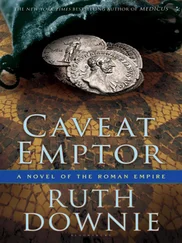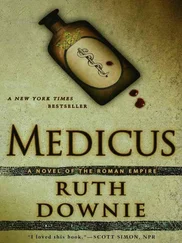Ruth Downie - Semper Fidelis
Здесь есть возможность читать онлайн «Ruth Downie - Semper Fidelis» весь текст электронной книги совершенно бесплатно (целиком полную версию без сокращений). В некоторых случаях можно слушать аудио, скачать через торрент в формате fb2 и присутствует краткое содержание. Жанр: Исторический детектив, на английском языке. Описание произведения, (предисловие) а так же отзывы посетителей доступны на портале библиотеки ЛибКат.
- Название:Semper Fidelis
- Автор:
- Жанр:
- Год:неизвестен
- ISBN:нет данных
- Рейтинг книги:5 / 5. Голосов: 1
-
Избранное:Добавить в избранное
- Отзывы:
-
Ваша оценка:
- 100
- 1
- 2
- 3
- 4
- 5
Semper Fidelis: краткое содержание, описание и аннотация
Предлагаем к чтению аннотацию, описание, краткое содержание или предисловие (зависит от того, что написал сам автор книги «Semper Fidelis»). Если вы не нашли необходимую информацию о книге — напишите в комментариях, мы постараемся отыскать её.
Semper Fidelis — читать онлайн бесплатно полную книгу (весь текст) целиком
Ниже представлен текст книги, разбитый по страницам. Система сохранения места последней прочитанной страницы, позволяет с удобством читать онлайн бесплатно книгу «Semper Fidelis», без необходимости каждый раз заново искать на чём Вы остановились. Поставьте закладку, и сможете в любой момент перейти на страницу, на которой закончили чтение.
Интервал:
Закладка:
Chapter 7
“Doctor Ruso, sir?” The voice echoed around the empty benches in the entrance hall of Eboracum’s hospital.
Ruso would have been hard-pressed to recall many faces from the ever-changing trail of young hopefuls who had followed him around the wards back at Deva, supposedly watching and learning. But standing before him was an older, thinner version of a short curly-headed youth whom he remembered only too well.
“It’s Pera, sir. I was-”
“You were at Deva,” said Ruso, grateful for the reminder of the name.
“We got your letter, sir,” said Pera. “Welcome to Eboracum.”
“Thank you,” said Ruso, trying to remember anything Pera might have done to distinguish himself apart from that unfortunate prank in the mortuary. The awkwardness of the pause that followed suggested Pera might be trying too.
“So, who’s in charge here?”
“I am, sir.” He sounded as if he was expecting this mistake to be rectified at any moment.
“Really?” said Ruso, recalling the disciplinary hearing where Pera had explained how, instead of leaping out from beneath a shroud to terrify his fellow students, he had made the catastrophic blunder of doing it in front of half a dozen relatives grieving for the man on the next table. “Excellent,” he said, realizing Pera had heard Really? as an expression of disbelief. “Well done.”
Pera looked relieved. “Thank you, sir.”
“Perhaps you could explain the setup here. I’d imagine the camp prefect’s rather busy welcoming the tribune.”
It was one of those conversations that reminded Ruso of all the things he liked about military medics. Pera, his confidence restored, did not waste time with rambling discourses on why all his rivals were fools, or praising his own secret medical recipes, or blaming the patients for his failures. Within minutes Ruso had a clear picture of the varied needs of two centuries of experienced but aging legionaries, a small auxiliary unit, and forty-eight recruits in basic training who were barely out of their teens. “Sorry. Forty-seven now, sir.”
What Pera did not say did not need saying. There was no need to elaborate on the usual struggle to impose ventilation, cleanliness, and sobriety upon men who would happily spend their off-duty hours drinking the local beer and their nights huddled in a warm fug of unwashed bodies. Nor did he need to explain that Eboracum, like much of Britannia since the uprisings in the North, was chronically undermanned. Pera’s small team was rattling around in a hospital built for a garrison ten times the current size. It was just as well the rebellious tribes had retreated to lick their wounds and bury their dead. Hadrian, who seemed like a sensible man, was seizing the chance to bring reinforcements and a fresh legion.
Pera was ushering Ruso through the side door and into the corridor when an orderly came to ask for guidance about a diet and a bandager wished to report that he thought a sprained wrist might be fractured.
Pera settled the diet question and promised to have a look at the wrist shortly. Turning to Ruso, he said, “What would you like to inspect first, sir?”
“Let’s start with the wrist.”
Pera looked pleased. Clearly the last thing he needed was to waste time escorting visitors around. By the time he pushed open the door of one of the treatment rooms to reveal a woebegone young man clutching his right arm, three more men had come to ask him for help or instruction, two of them wanting orders about what should be cleared out and what should be packed for the impending move to Deva.
“Why don’t I see to this chap?” Ruso suggested, making a mental note to talk to Pera about training and delegation.
“He’ll be honored, sir.”
“Then we’ll both be out of your way.”
When Pera grinned, he looked almost as young as the recruits.
Sulio had confounded Dexter’s attempts to clear the area by leaping beyond the straw mattresses, and several men had fallen awkwardly in the rush to get clear of the plummeting body. As Ruso splinted and strapped up the wrist and congratulated the orderly on spotting the symptoms that might indicate a cracked bone, he went through the usual speech about the bandaging being loose enough for swelling. “Come straight back if your fingers start to tingle or go numb. We’ll splint it properly in a couple of days, then you’ll have it held in position for about six weeks.”
“Will I be discharged, sir?”
Ruso looked up from the wrist, surprised. “Gods above, no. It’ll probably be fine in a couple of months. I’ll give you a chit to show your centurion at Deva, so he won’t undo all my good work with sword drill.” He turned to the orderly. “Could you organize that straightaway, do you think?”
The orderly turned to leave. One of the men who had been on the roof limped out ahead of him on a bandaged foot.
When they had gone Ruso said, “You can do any training that doesn’t involve the arm. Keep the wrist in a sling during the day for at least a week, and don’t use it until we say you can.”
The youth said, “Thank you sir,” with all the gratitude of a man who had just been handed a bagful of snakes.
Ruso said, “How’s the pain?”
“Not too bad, sir.” The youth seemed almost disappointed.
“You’ll be excused from carrying your kit back to Deva.”
Most men would have been pleased to hear that, but this one seemed not to care. Ruso was tempted to point out that, compared to the dead man, he had little to complain about. Instead he said, “I’m sorry about your comrade. Did you know him well?”
“It’s all right, sir,” said the youth, staring at the floor. “You don’t need to pretend. We know nobody wants us at Deva.”
Ruso frowned. “What’s given you that idea?”
“We’re an unlucky unit, sir.” The youth’s weary gaze met his own. “They say we’re-”
Before he could finish, a voice from the doorway called, “You there! Get a grip!” The youth gulped and fell silent.
Pera appeared, clutching a bottle of green fluid. He crouched down beside the youth and hissed in his ear, “Sulio chose to take his own life. The others were accidents. Any more talk like that and you’ll be on a charge. Understood?”
“Yes, sir.”
“Is that understood?”
The youth straightened his back, squared his shoulders, and stared into the middle distance. “Yes, sir!”
Ruso wondered who “the others” had been, and reflected that the prankster from the mortuary was much changed.
Chapter 8
The occupied rooms of Eboracum’s hospital were at the front by the entrance hall, while the kitchens were in one far corner and baths in the other. Kitchen staff and bathers were thus obliged to traverse long corridors lined with gloomy wards whose shuttered windows would have offered a fine view of native weeds strangling the herbs in the courtyard. Ruso waited until they were alone in such a corridor before he asked Pera to explain
The others were accidents.
“This way, sir.” Pera looked both ways before ushering Ruso through the nearest door and closing it behind him. “Is that why you’ve come to inspect us, sir? Because of the accidents?”
“No, this is just routine.” It was true. A routine invented only last week was still a routine if one had plans to stick to it. “But since I’m here, can I help?”
Instead of answering, Pera opened the door and stepped back into the light of the corridor. “Sorry, sir. Wrong room.”
Ruso stayed where he was. “Tell me about the accidents.”
At the sound of distant voices, Pera flattened one arm against the door as if to hold it wide for his old tutor’s exit. “We’re not using this ward anymore, sir. I forgot.”
Читать дальшеИнтервал:
Закладка:
Похожие книги на «Semper Fidelis»
Представляем Вашему вниманию похожие книги на «Semper Fidelis» списком для выбора. Мы отобрали схожую по названию и смыслу литературу в надежде предоставить читателям больше вариантов отыскать новые, интересные, ещё непрочитанные произведения.
Обсуждение, отзывы о книге «Semper Fidelis» и просто собственные мнения читателей. Оставьте ваши комментарии, напишите, что Вы думаете о произведении, его смысле или главных героях. Укажите что конкретно понравилось, а что нет, и почему Вы так считаете.












